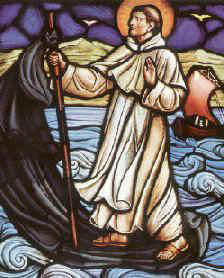|
To work for the proper implementation of canon law is to play an extraordinarily constructive role in continuing the redemptive mission of Christ. Pope John Paul II |
|
|
|
|
Resolution 1152 x 864 |
Updated 7 feb 2014 |
Resources on current eligible papal electors Please note: This page is no longer maintained. |
|
Overview
|
The election of the Roman Pontiff has been reserved to the College of Cardinals since the late 13th century. Under current ecclesiastical law all cardinals under the age of 80 are eligible to vote, except that cardinals whose names remained reserved by the pope "in pectore" (currently none) are ineligible. Voting is secret and politicking is prohibited. There are presently 106 cardinals (a papally self-imposed limit of 120 electors is occasionally exceeded), some of whom are retired (emeritus) from their last posts, eligible to vote in the next papal conclave.
|
|
The Law |
1983 CIC 349. S. R. E. Cardinales peculiare Collegium constituunt, cui competit ut electioni Romani Pontificis provideat ad normam iuris peculiaris; Cardinales item Romano Pontifici adsunt sive collegialiter agendo, cum ad quaestiones maioris momenti tractandas in unum convocantur, sive ut singuli, scilicet variis officiis, quibus funguntur, eidem Romano Pontifici operam praestando in cura praesertim cotidiana universae Ecclesiae. • Eng. trans. 1983 CIC 349. The cardinals of the Holy Roman Church constitute a special college which provides for the election of the Roman Pontiff according to the norm of special law. The cardinals assist the Roman Pontiff either collegially when they are convoked to deal with questions of major importance, or individually when they help the Roman Pontiff through the various offices they perform, especially in the daily care of the universal Church.
John Paul II, ap. con. Universi Dominici Gregis (22 feb 1996), AAS 88 (1996) 305-343, Eng. trans on-line here, establishing particular law referenced in the Code.
Benedict XVI, m. p. Constitutione apostolica (11 iun 2007), AAS 99 (2007) 776-777, on-line PDF here, abrogating UDG 75 so as to reestablish the requirement of a two-thirds majority of electors for valid election to papacy.
Benedict XVI, m. p. Normas nonnullas (22 feb 2012), L'Osservatore Romano =, Latin text here, derogating from several parts of Universi.
|
|
See also
Cardinals of the Holy Roman Church
● not likely to participate in a conclave
● not likely to participate in a conclave |
|
|
John Foster, "The election of the Roman Pontiff: an examination of Canon 332, § 1 and recent special legislation", The Jurist 56 (1997) 691-705.
Edward Peters, "The next papal conclave", This Rock (Oct 1996) 30-31, available here.
See also my blog posts on: Ineligible Papal Elector (2005) • Violating Secrecy (2005).
|
|
Notes on the 1922
Cardinal Piffl (Vienna) kept private records during the papal conclave that elected Achille Ratti as Pius XI. These were discovered after Piffl's death in 1932, and published in The Tablet on 5 Oct. 1963, at 1060. They are also available in J. Noonan, Power to Dissolve (1972), at 407.
According to Piffl, 15 candidates received at least one vote in the course of 14 ballots held during the four-day conclave. Below, candidates names (canon lawyers in bold) are listed by greatest number of votes attained in one or more ballots:
Ratti 42 Gasparri 24 La Fontaine 23 Merry de Val 17 Maffi 10 Belmonte 8 Laurenti 5 Bisleti 4 Van Rossum 4 De Lai 2 Pompilj 2 Giorgi 1 Lega 1 Mercier 1 Sbaretti 1
These records suggest what I think might well be called "The Canonists' Conclave of 1922." PS: Retaining personal notes such as Piffl did is now forbidden by papal law (UDG 71).
|
What do Canon Lawyers think is funny?
* * * OFFICIAL: Question Four, octogenarian cardinals lose the right to elect the Roman Pontiff. There are eleven Fathers asking for discussion of this point [all names are listed, led by Cdl. Seper's].
FELICI: We move next to Question Four, which refers to draft canon 290, whereby octogenarian cardinals lose the right to vote for the Supreme Pontiff. Now, before this question is discussed and the one who first brought it up explains his reasons, it is my duty to tell you that I have already spoken about this matter with the pope while going over various topics to be looked at in this session, and I asked him whether he thought it was a good idea to include this question among the six to be reviewed. And the Supreme Pontiff told me he was not pleased. True, he did not revoke permission to discuss the topic, but he would prefer that it not be included among the topics, basically because this issue concerns the Supreme Pontiff, but for all that, he did not forbid debate if the Fathers still want to talk about it. That said, it's time for someone who has asked for this discussion to explain his reasons. ... Anyone? ... Come on, there are eleven signatures on this sheet! ... Card. Seper.
SEPER: I may say, there doesn't seem to be much point in discussing this now. [Seper briefly explained that he was not opposed to the rule itself, but that he wanted it treated outside of the new Code.]
FELICI: Okay, is there anyone else who wants to say something on this? ............ Nobody? .......... Well, let's vote.
OFFICIAL: How many are left to vote on Question Four?
FELICI: Not many. Most of them have left to attend an audience with the Pope. Fine.
* * * Postscript: By special secret ballot, 41 of the 53 cardinals who stayed for the vote asked that the disqualification not be included in the 1983 Code, and in fact the rule does not appear in the new Code. But it is still contained in the special law governing papal elections, and thus is still in force. Anyway, I thought the little exchange above was funny. Maybe one had to be there.
|
|
|
|





